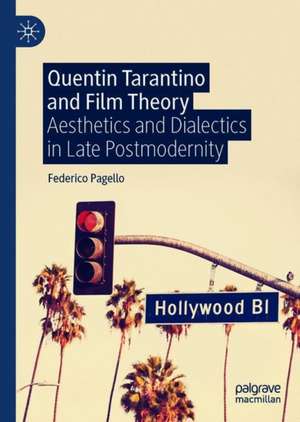Quentin Tarantino and Film Theory: Aesthetics and Dialectics in Late Postmodernity
Autor Federico Pagelloen Limba Engleză Hardback – 21 oct 2020
| Toate formatele și edițiile | Preț | Express |
|---|---|---|
| Paperback (1) | 635.96 lei 6-8 săpt. | |
| Springer International Publishing – 21 oct 2021 | 635.96 lei 6-8 săpt. | |
| Hardback (1) | 640.24 lei 6-8 săpt. | |
| Springer International Publishing – 21 oct 2020 | 640.24 lei 6-8 săpt. |
Preț: 640.24 lei
Preț vechi: 753.22 lei
-15% Nou
Puncte Express: 960
Preț estimativ în valută:
122.51€ • 126.39$ • 102.24£
122.51€ • 126.39$ • 102.24£
Carte tipărită la comandă
Livrare economică 26 martie-09 aprilie
Preluare comenzi: 021 569.72.76
Specificații
ISBN-13: 9783030438180
ISBN-10: 303043818X
Pagini: 158
Ilustrații: VIII, 210 p. 1 illus.
Dimensiuni: 148 x 210 mm
Greutate: 0.41 kg
Ediția:1st ed. 2020
Editura: Springer International Publishing
Colecția Palgrave Macmillan
Locul publicării:Cham, Switzerland
ISBN-10: 303043818X
Pagini: 158
Ilustrații: VIII, 210 p. 1 illus.
Dimensiuni: 148 x 210 mm
Greutate: 0.41 kg
Ediția:1st ed. 2020
Editura: Springer International Publishing
Colecția Palgrave Macmillan
Locul publicării:Cham, Switzerland
Cuprins
Introduction – From High to Late Postmodernism.- Part One – The Aesthetics of Late Postmodernism.- Chapter 1 – Absolute Style.- Chapter 2: Space as History.- Chapter 3 – Time as Language.- Part Two – The Return of Dialectics.- Chapter 4 – Narrative and Subjectivity.- Chapter 5 – The “Vanishing Point” of Sexual Difference.- Chapter 6 – The Endless End of History.- Conclusion – Godard with Tarantino: Cinema as Enjoyment.
Caracteristici
Offers an ambitious theoretical assessment of Tarantino’s cinema in relation to key issues in contemporary film theory Engages with questions about the ongoing relevance of postmodern theory to understand the work of Tarantino from an aesthetic and dialectical perspective Puts Tarantino’s films in conversation with the theories of leading philosophers and scholars Jacques Rancière, Fredric Jameson, Slavoj Zizek and Carol Clover to offer a stimulation approach to ‘late’ postmodern cinema
